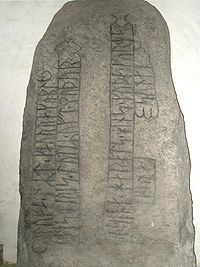- Sønder Vissing Runestone
-
Runestone 
Name Sønder Vissing I Rundata ID DR 55 Country Denmark Region Jutland City/Village Horsens Produced 10th century Runemaster Unknown
Text - NativeOld Norse: Tofa let gørwa kumbl, Mistiwis dottiR, æft moþur sina, kona Haralds hins Goþa, Gorms sonaR.[1] Text - English Tófa, Mistivir's daughter, wife of Haraldr the good, Gormr's son, had the monument made in memory of her mother.[1] Other resources Runestones - Runic alphabet
Runology - Runestone stylesSønder Vissing I or DR 55 is a runestone located in the church of Sønder Vissing in eastern Jutland, Denmark. Sønder Vissing is a small settlement located in Horsens municipality approximately 20 km south of Silkeborg, 20 km west of Skanderborg and 40 km northeast of the Viking monuments of Jelling.
Contents
Description
Sønder Vissing I was discovered in 1836 as part of the stone fence around the church cemetery. and became the object of a study by P. G. Thorsen published as Den Søndervissingske Runesten in 1839.[2] It dates from the second half of the 10th century and was raised by Harald Bluetooth's first wife Tofa after her mother.[3] Tofa was the daughter of Mstivoj, a king of the Obodrites, and the stone is one of few runestones raised after a woman.
Danmarks Runeindskrifter considers the idenfication of the inscription's "Harald the Good" with Viking king "Harald Bluetooth" likely although this form of the name is not known from other sources. The actual inscription is possibly influenced by Swedish practice since the second word uses the rune R to represent either "e" or "æ", a practice also seen on the Hobro II runestone. The connection with the Jelling stones is supported by the inscription's inclusion of a frame.[4]
Transliteration of the runes into Latin characters
- tufa ' lRt ' kaurua ' kubl ¶ mistiuis ' tutiR ' uft ' muþur ¶ sina ' ¶ kuna ¶ harats ' hins ' kuþa ' kurms ¶ sunaR[1]
Sønder Vissing II
A second runestone, Sønder Vissing II or DR 56, was discovered as part of the pavement of the entrance to the church cemetery, also in 1836. This exposed location — near the site of the first stone — is the reason why Sønder Vissing II's inscription is more damaged than the inscription of Sønder Vissing I.
Both stones were moved following their discovery. Sønder Vissing I was moved into the church by 1838 and has since 1897 been located next to the church organ. Sønder Vissing II was moved to the church cemetery in 1838 and has since 1897 been in the church porch.
Transliteration of the runes into Latin characters
- tuki ' karþi ' kumbl ' þisi ' iaft ¶ aba ' faþur ' sin ¶ uhimskąn ' hal[5]
Transcription into Old Norse
- Toki gærþi kumbl þæssi æft Apa/Æbba, faþur sin, uhemskan hal.[5]
Translation in English
- Tóki made this monument in memory of Api/Ebbi, his father, a wise hero.[5]
Notes
- ^ a b c Project Samnordisk Runtextdatabas Svensk - Rundata entry for DR 55.
- ^ Jakobsen, Lis and Moltke, Erik (1942), Danmarks Runeindskrifter, Copenhagen: Ejnar Munksgaards Forlag, vol. II, column 93-95.
- ^ According to Nordisk Familjebok's entry on Harald Bluetooth.
- ^ Jakobsen, Lis and Moltke, Erik (1942), Danmarks Runeindskrifter, vol. II, column 94.
- ^ a b c Project Samnordisk Runtextdatabas Svensk - Rundata entry for DR 56.
Sources
Coordinates: 56°1′23.41″N 9°38′31.66″E / 56.0231694°N 9.6421278°E
Categories:- Runestones in Denmark
- Runestones raised in memory of women
Wikimedia Foundation. 2010.
